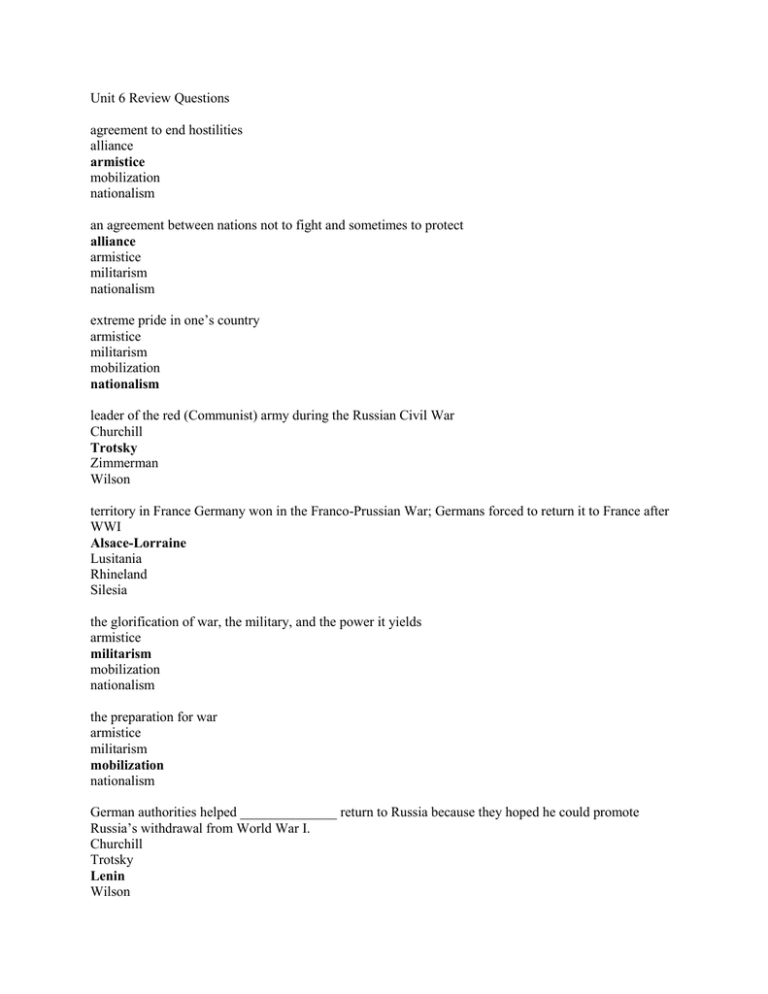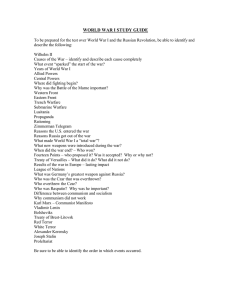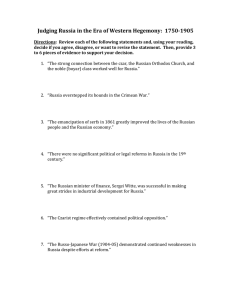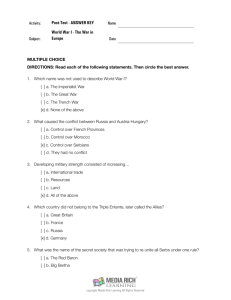Unit 6 Review Questions agreement to end hostilities alliance
advertisement

Unit 6 Review Questions agreement to end hostilities alliance armistice mobilization nationalism an agreement between nations not to fight and sometimes to protect alliance armistice militarism nationalism extreme pride in one’s country armistice militarism mobilization nationalism leader of the red (Communist) army during the Russian Civil War Churchill Trotsky Zimmerman Wilson territory in France Germany won in the Franco-Prussian War; Germans forced to return it to France after WWI Alsace-Lorraine Lusitania Rhineland Silesia the glorification of war, the military, and the power it yields armistice militarism mobilization nationalism the preparation for war armistice militarism mobilization nationalism German authorities helped ______________ return to Russia because they hoped he could promote Russia’s withdrawal from World War I. Churchill Trotsky Lenin Wilson France, Russia, and ______________ were members of the Triple Entente. Austria-Hungary Serbia Belgium Great Britain The Bolsheviks won the civil war in Russia because they were better organized than the ______________ and other opponents of the socialist state. Whites Reds Greens Blues The NEP was primarily successful in the urban centers of Russia. the rural centers of Russia. areas with a Slavic majority. areas with high numbers of Russian Orthodox Christians. the NEP benefited the peasants, but left the cities without enough food to survive The Bolshevik forces led by Leon Trotsky were the White Army. Red Army. Green Army. Blue Army. The war strategy that called for the quick defeat of the French followed by an offensive on the Eastern Front against Russia was called the Sussex Pledge Shlieffen Plan Zimmerman Note Fourteen Points Woodrow Wilson’s plan for peace that included the ideas of free trade and open diplomacy, national selfdetermination, and the establishment of the League of Nations was the Sussex Pledge Shlieffen Plan Zimmerman Note Fourteen Points The President of the United States during World War I was Churchill Trotsky Lenin Wilson World War I was fought between the years of 1910-1914 1912-1916 1914-1918 1918-1920 The mystical healer and adviser to Czar Nicholas II and Czarina Alexandra was Gavrilo Princip Rasputin the Black Hand Archduke Ferdinand The Treaty of Versailles resulted in all of the following EXCEPT German payment of reparations to the Allied nations the return of Alsace-Lorraine to France France’s loss of German-speaking areas in the Alps Germany’s loss of its overseas possessions Austria-Hungary’s ultimatum to Serbia was triggered by Germany’s invasion of Belgium the sinking of the Lusitania the assassination of Archduke Ferdinand the Zimmerman telegram The Archduke of Austria-Hungary was assassinated because Austria-Hungary was set to invade Serbia. the assassin and his group wanted a separate Slavic state. the Archduke had denied the Slavs a voice in the government. the Archduke was disliked by all. Russia declared war on Austria-Hungary because it feared an Austro-Hungarian mobilization close to its borders. it counted on the Germans for military assistance. it wanted the territories held by Austria-Hungary. it was the traditional protector and ally of Serbia. Russians were unhappy with Czar Nicholas II’s rule for all of the following reasons EXCEPT they were experiencing a serious shortage of food and fuel. they believed the czar was politically incompetent. they resented the czar and czarina’s reliance on a consultant named Rasputin. they resented the czar’s withdrawal of troops from WWI. Russia did not leave the war until after the Revolution A few of the new nations created after World War I were Czechoslovakia, Yugoslavia, and Poland. Poland, Yugoslavia, and Albania. Czechoslovakia, Bulgaria, and Romania. Poland, Hungary, and Albania. Woodrow Wilson’s chief goal at the peace conference was to make Germany pay for the war it caused. strip Germany of its overseas possessions. create the League of Nations. create an alliance against future German and Russian threats. The Treaty of Versailles stabilized Germany’s economy. left Germany weaker, although still a respected international power. it left Germany humiliated and resentful of the Allied nations. it allowed Germany a quick, easy reconciliation with its neighbors. Soviets were local councils of workers and soldiers throughout Russia. special committees of the Duma (Russia’s parliament). field officers of the Bolshevik movement who directed revolutionary forces during 1917. non-Russian territories controlled from Moscow during the Russian Revolution. All of the following countries were members of the Central Powers EXCEPT Germany Ottoman Empire Austria-Hungary Serbia The purpose of Europe's military alliances was to begin a war. build military strength. support conscription in each nation. create a balance of power. All of the following countries were members of the Allied Powers EXCEPT Great Britain Ottoman Empire France Russia The Triple Alliance was made up of Germany, Austria-Hungary, and Italy. Britain, France, and Germany. Russia, Austria-Hungary, and France. France, Germany, and Italy. Britain got involved in the war because it was an ally of the United States. attacked by Austria-Hungary. attacked by Germany. an ally of Belgium. Russians suffered badly in World War I because they were fighting on both the Eastern and Western Fronts. did not have the supplies to fight a modern war. did not have the support of their allies. did not have enough soldiers to send to war. The sinking of the British ship the Lusitania helped draw the United States into the war because it was an American battleship. it was part of the navy blockade. 128 Americans on board died. it had sailed into a war zone. Which of the following was NOT a major element in the German collapse of November 1918? A naval mutiny against the disastrous plan to attack the combined American and British navies. The sudden death of Kaiser Wilhelm’s heir. The declaration of a republic in Bavaria and socialist revolts elsewhere in the country. Scarce food supplies which left some Germans on the verge of starvation. As a result of trench warfare, the war on the Western Front became a stalemate. proved the success of the Schlieffen Plan. saw the German side dug in, but not the Russian side. saw the French defeat Germany. The Russian Revolution of 1917 was caused in part by the czar's decisions about the war and the economy. Rasputin's allegiance to the czar and his family. Trotsky's management of the soviets. the aristocrats' attitude toward the peasants. World War I affected women’s jobs in that more jobs were created just for women. fewer women worked outside the home. women filled many jobs that men had held. women joined the military and lost their jobs. In response to Rasputin's influence on the czar and the court, Russian aristocrats formed a provisional government. brought Lenin to power. assassinated Rasputin. asked Nicholas II to abdicate. The United States entered World War I largely over the issue of Serbian independence. German use of zeppelins. trench warfare. unrestricted submarine warfare. England sought to forge alliances with France and Russia because Russia and France had declared war on Austria-Hungary. President Wilson encouraged England to regulate European alliances. Germany had become a world power and England wanted a closer relationship with it. Germany was creating a naval fleet that threatened the British navy. The Bolsheviks were able to ultimately triumph in October 1917 under the leadership of the young, dedicated revolutionary Alexander Alexandravich Kerensky. Vladimir Ilyich Ulyanov. Lev Denisovich Bronnstein. Nicholas Alexandravich Romanov. German unification and the emergence of the German Empire lead to European tensions because several countries feared Germany would invade them and begin to create alliances. many countries were outraged that Germany had signed an alliance with France. Russia began invading neighboring Slavic countries to create its own empire. England declared war on Germany for its invasion of France. “No-man's-land” was dangerous because the soldiers did not know where they were going when they tried to cross it. many soldiers were killed while crossing it. both sides claimed it as their own territory and fought over it constantly. the French were determined not to let it fall to the enemy. The Bolsheviks under Lenin attempted to gain support in the summer of 1917 with the slogan “Peace and the Romanovs!” “Peace, Land, and Bread!” “Hang the Kaiser!” “All Power to the Dumas!” The event that allowed Germany to sign a treaty with Russia, ending fighting in the east was the defeat of Russian forces in Poland by the German army. a freak, frigid winter that caused Russians to want to end their war with Germany. the Russian Revolution and establishment of a Communist state. Czar Nicolas II's desire to get out of the war and help the Russian people survive. The primary reason that the US Senate rejected the Treaty of Versailles Its terms against Germany were not harsh enough. Wilson had not included Republicans in the negotiations. It rejected the notion of a League of Nations. It was concerned about the German economy. In the years preceding World War I, Europe was divided into two groups of nation-states united by treaty. Germany, Austria–Hungary, and Italy were opposed by Russia, France, and Great Britain, who were known collectively as the Three Democracies. Triple Alliance. Triple Entente. Triple Threat.






